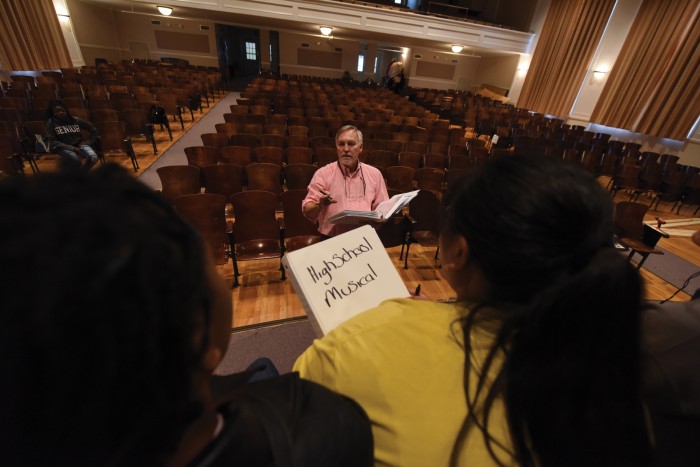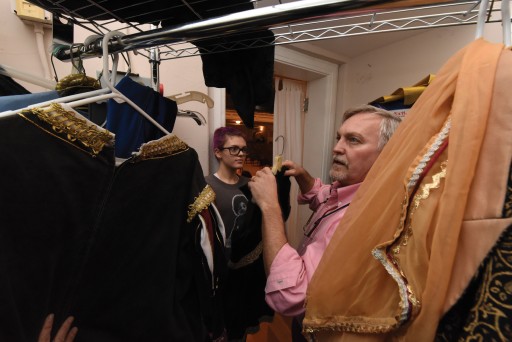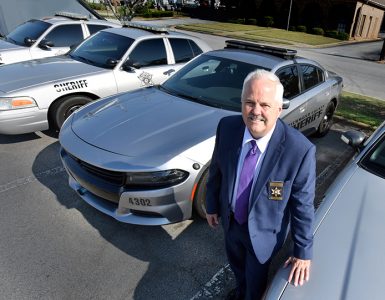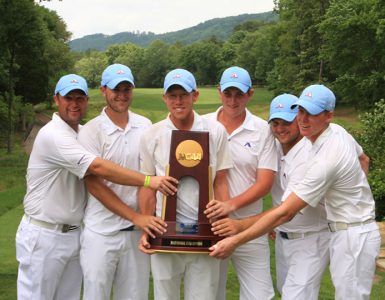Four years ago, the theater program at the Academy of Richmond County was practically nonexistent. It had approximately 40 students with one beginning theater class and a couple of music classes, but there were no productions and no advanced course offerings. It existed, but barely.
Something needed to change.
So, at a time when, according to the Georgia Budget and Policy Institute, 42 percent of Georgia school districts were reducing or eliminating their art and music programs, educators and administrators at ARC planned to do the exact opposite.
They decided to build the program. It was a bold move.
Tim Spivey, then-principal of ARC, remembers wanting to give students who weren’t necessarily interested in athletics an opportunity to be involved with extracurricular activities. He believed that if his students were involved in extracurricular activities, they would be more successful academically. To achieve that for his nonathletes, it was only natural to lean on his fine arts department, which was already strong.
“When you have a good fine arts department, it gives all students a chance to participate in something,” Spivey said. “People want to be involved in successful programs. It’s contagious, and it makes the school atmosphere better.” But no matter how strong the department may have been, there was no avoiding the fact that the Theater Department needed help. In order to draw kids in, Spivey needed to find someone to breathe life into it, so he turned to Mollie Baldwin, an ARC music teacher who shared his belief in the theater program’s potential, for advice.
“For 20 years, I taught chorus and music classes at Richmond but saw such a need for theater,” Baldwin said. “You find a child who has a need for self-expression, but maybe they don’t have musical ability. Theater speaks to a whole different set of skills.” But recognizing the need was the easy part. Finding someone to take it over was the challenge. And yet, Baldwin had an idea.
She’d first heard about the guy from her high school drama director, long before she’d accepted a job teaching at ARC. He was legendary, in fact, and his reputation had only grown during the 30 years she continued to bump into him at competitions. And while in education circles, he was best known as one of the masterminds behind Harlem High School’s nationally renowned drama program, he had also built a reputation around the Augusta area for his involvement with the Augusta Players, Fort Gordon Dinner Theatre, Le Chat Noir and other theater organizations.
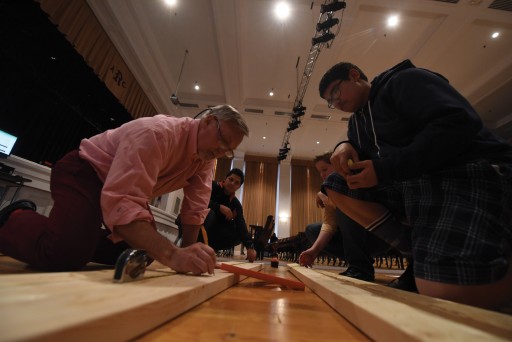 In fact, they even sang together in the church choir, he as a choir member and Baldwin as the director. And though the word was already out that he was planning to retire from teaching full time at Harlem, he’d mentioned to her how it might be nice to continue teaching part time somewhere else. So, when Spivey decided he wanted to beef up the drama program, for Baldwin, there was only one candidate: Roy Lewis.
In fact, they even sang together in the church choir, he as a choir member and Baldwin as the director. And though the word was already out that he was planning to retire from teaching full time at Harlem, he’d mentioned to her how it might be nice to continue teaching part time somewhere else. So, when Spivey decided he wanted to beef up the drama program, for Baldwin, there was only one candidate: Roy Lewis.
There are no small parts, only small actors.
Originally from Ellabell, Georgia, a small, rural community outside of Savannah, Lewis grew up on a 600-acre farm. He spent his days raising chickens, pigs and cows. Together, Lewis and his family planted seeds, plowed the land and performed various chores needed to keep the farm running.
Lewis was in elementary school when he made his debut in a school play. He was the smallest billy goat in the Three Billy Goats Gruff. It was this role that sparked his interest in theater. However, growing up on a farm didn’t leave much time for theater. Even if Lewis wanted to be involved with a theater company, he couldn’t. The farm was more than 20 miles from town. He was isolated. But performing in that play had awakened something in him, and Lewis began looking for creative ways to entertain himself and his three sisters.
“We would run and play and let our imaginations run wild, like the weeds on the farm,” he said.
And he would sing. He would sing to anyone who was around, and if no one was around, he would sing to the cows. Real songs, made up songs – it didn’t matter what he was singing, it only mattered that he was singing. Some days, when his mother couldn’t find him, she just listened closely. Lewis’ singing was his personal compass. In spite of all that rehearsing, it wasn’t until high school that Lewis acted in his first formal play with a script, and it would be years until he commanded a stage, or a classroom.
Lewis would eventually accept a job teaching drama at Harlem. It didn’t take long for him to begin making waves.
“I was always impressed with the care Roy took with his students,” Baldwin said. “He was about looking at what gifts each child had hidden away, and he would find a way to bring those gifts out in his students. Roy seemed to show them that with discipline and desire, they could develop their gifts. It made such a positive difference.”
Lewis believes that every child can learn and every child should have the opportunity to learn. Theater, he says, teaches students how to work together, learn from one another and prepare for the world outside of high school. Although Lewis spent many years as the drama director at Harlem, his focus was never finding and nurturing the next Broadway or Hollywood star. His teaching philosophy is much simpler than that, and the impact much larger.
“I want to help each student find their path, define their goals and discover who they are and what they want to become,” Lewis said. “No one can exist alone. We all need each other.”
Through theater, Lewis is teaching his kids valuable life skills that, he hopes, will outlast high school. His efforts have not gone unnoticed.
Once he had a student who joined his class in order to spend extra time with a girlfriend, a tough guy who thought he was too cool for acting. It didn’t bother Lewis that the kid was there to pursue a girl. It never matters to him why students join his class. He’s just glad they do, because he knows theater can do so much for them.
“Kids come in and they’re resistant because they don’t want to fail and be embarrassed,” he said. “But when you’re in theater, you have to be honest with yourself in order to be honest with the audience. They’re very quick to see through and judge any falseness. When I get them up on stage, they have to be honest. You can’t hide on stage. That in itself is life-changing.”
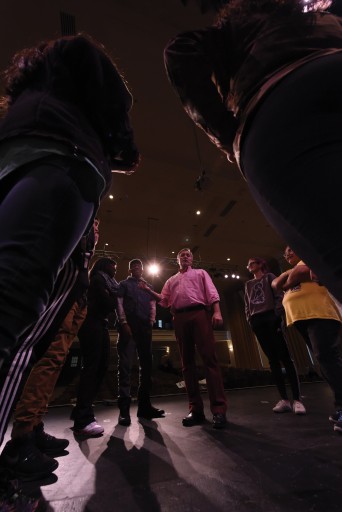 In this case, he convinced the student to be a lead in a play. Many years later, the student thanked him.
In this case, he convinced the student to be a lead in a play. Many years later, the student thanked him.
“Before your drama class, I didn’t feel as though I fit anywhere, and I was a genuine teenager with angst,” he wrote in a text. “Your devotion to your craft changed me as a person. Thanks for allowing me to become my own person.”
This student is now a teacher, and that text is still saved on Lewis’ phone. These gifts of gratitude, as Lewis calls them, are not uncommon. Students recognize his desire to make a difference in their lives.
In all, Lewis spent more than 30 years teaching at Harlem, often working up to 80 hours a week. And if that weren’t enough, he even returned to school. His belief in the power of education and his commitment to his students was that strong. He enrolled at what was then Augusta College and pursued a specialist degree in teaching and curriculum. It was the right decision.
“The program was great,” Lewis said. “The faculty was helpful in guiding me to make the best choices for my career.”
Lewis found himself among friends when he attended class. This made it easy to share ideas, teaching strategies and effective teaching skills. “Although we may differ in some areas, all good educators work for the best for each student,” he said. “Each student can learn, and as educators, we are challenged to ensure that learning occurs for the betterment of each student so that they may discover success in their educational journey.”
Lewis left Augusta College with his specialist degree, feeling refreshed and excited to continue teaching. “I always feel like there’s one more student I can reach,” he said. “I don’t do this for the money. I teach because I have a passion for it. At the end of the day, kids are kids and all they want is to be loved.”
So when Baldwin asked, Lewis said yes and accepted the position at ARC.
A new beginning
In May 2012, Lewis retired from Harlem High School, and in August, he opened the doors to his classroom at ARC and slowly started building the theater program. He taught three classes and worked with students on after-school performances. Lewis was quickly building the foundation of a successful theater program. Nothing was off-limits.
His classroom was, and still is, the auditorium at ARC. It was built in 1926, and it has stayed more or less the same ever since. The need for renovation severely limited what Lewis and his students could accomplish on stage, so he got to work identifying the changes that needed to be made.
Lewis upgraded the theater’s lighting system and bought a new light board. Stock pieces were organized and equipment was updated. He started a costume collection, even teaching his students the basics of sewing. Three classes became four, and Lewis was teaching beginning, intermediate, advanced and technical theater classes.
The program was growing quickly, just as Spivey had hoped, and within Lewis’ first year at ARC, the students competed in a one-act play competition. They won the region and went on to place third in the state. It was the department’s first production.
Later in that same year, students performed their first full-length musical, Once on This Island. “Usually, theater programs do not build this fast,” Baldwin said. “It’s all because Roy came in with more than 30 years of experience, and he has such a passion for teaching.”
While all the changes took time and effort, Lewis’ focus on his students has never wavered. “I want to make a positive difference in their lives,” he said. “Whether I get to see it, or realize it, is not as important to me as their journey. I really want them to find the best in life.”
In a recent rehearsal for an upcoming competition, Lewis advised his students to reflect on their monologues. He urged them to find a connection with the character. The point of this exercise, he explained, was to push his students to look within and be honest with themselves. Lewis’ students find that most of their activities have a similar dual purpose – to succeed on stage and develop life skills.
In one lecture, Lewis warned his students that anything can happen when you’re on stage – it’s how you react to it that matters. Your costume may rip, but you’ve got to keep going, he said. You can’t drop your guard or give up. He wants his students to develop grace under pressure, not only because it will help them grow as actors, but because it’s a valuable skill for life beyond the stage.
“When you’re in situations where you’re interviewing for jobs or applying for scholarships, you need to be able to present yourself well and handle the situation,” he said.
With Lewis, nothing is accidental – not the lessons learned and not even the choice of plays, although sometimes their impact can be surprising. Lewis sees each activity as a way to make his students well-rounded people. Case in point, a recent play, Four Little Girls: Birmingham 1963. He thought the play would be a great educational opportunity for his students. It turned out to be much more than that. After the performance, a man approached Lewis and his students. He was in tears as he explained what the play meant to him. This man had marched in Selma.
“It was so moving, and the kids just embraced him,” Lewis said. “At that moment, worlds changed. These experiences are making them better-rounded people. It’s opening up worlds for them that aren’t just words in a book, but reality.”
Lewis’ passion for teaching isn’t limited to the students in his theater class, but extends to the entire ARC student body. A former high school basketball player, Lewis has a heart for athletics. In addition to teaching a full-time workload as a part-time teacher, he is also the assistant basketball coach for the junior varsity girls’ team.
He is the team’s number one motivator and supporter, explains Peaches Stephens, the girl’s head basketball coach at ARC. “Roy not only provides basketball knowledge, but his best asset is in providing motivation and inspiration to the team,” she said. “Even when they’re down, he’s always there to boost them up, make sure they think positive thoughts and grow and learn from every experience, win or lose.”
Former students are not surprised to hear of the affection ARC has for Lewis.
Keith Manasco currently works as a music teacher at C.T. Walker Magnet School. He met Lewis when he was a sophomore at Harlem. Manasco had been singing in church choir since the fourth grade, so he was already well-acquainted with the world of music, but he didn’t have theater experience. In spite of that, Lewis convinced him to audition for a nonspeaking role in Fiddler on the Roof.
Manasco landed the role. It was his first musical theater experience. He describes the experience as magical. “Mr. Lewis gave a shot to an inexperienced singer from Pennsylvania and turned him into a teacher of 11 years who now continues to share musical theater with his students,” he said. “Calling him a teacher would be a serious injustice, because he was and continues to be so much more. He is what I strive to be as a teacher.”
Manasco’s perception of Lewis is not uncommon. In fact, many of his students feel similarly. Joseph Alvarnaz began Lewis’ class as a shy student who didn’t venture outside of his close-knit group of friends, but that’s not how he ended class. By the time he graduated high school, he was the front man of a local band that played concerts across the Augusta area. He gives Lewis the credit for this transformation.
“He pushed me to open up, and I probably wouldn’t be the person I am today without having experienced his classroom and the things he was preaching to us,” Alvarnaz said. “He made us get up on stage and wouldn’t take no for an answer. You had to get up in front of people, and you had to climb outside of yourself and play pretend like a child. In his class, you felt safe to do that. I took that personally and took that into my own life afterwards.”
[su_pullquote align=”right”]I always feel like there’s one more student I can reach. – Roy Lewis[/su_pullquote]
Alvarnaz is now a Spanish teacher at Cross Creek High School and again gives credit to Lewis. “It’s common knowledge that you teach how you learn,” he said. “You pick the greatest things you’ve experienced, and you try to emulate them. I think his personality and how he approached his students is how I model my classroom.”
Lewis’ ability to connect with and inspire his students is unique. Doug Joiner, professor at Augusta University and Lewis’ friend, describes Lewis as an originator. There are replicators and originators, and Lewis is an originator. “That’s a compliment,” Joiner said. “Anyone can copy.”
Curtain Call
Under his supervision, the Theater Department at ARC has continued to grow. Students have experienced success on both a regional and a state level. ARC is home to Governor’s Honors finalists and will host a regional August Wilson monologue competition. ARC students have traveled around the state of Georgia to perform at the Georgia Theater Conference. They participate in regional one-act play competitions, and every year, Lewis’ students perform a spring musical which utilizes both faculty and students.
Four years ago, there were 40 students in the theater program, and now Lewis has 150 students, with no signs that it’s losing momentum. In fact, with the program’s continued growth, administrators are planning on hiring a full-time drama director. One that will replace him.
And Lewis is fine with that. Once again, he’s willing to leave his legacy in the hands of a new teacher, but don’t expect him to retire any time soon. As long as there are students willing to learn, you can expect Lewis will still be around, lending a hand.

